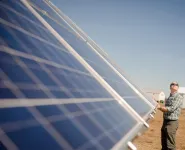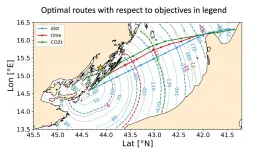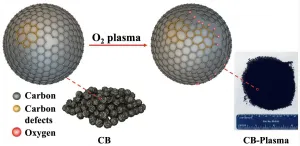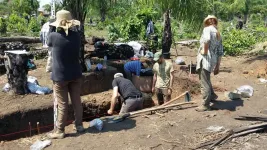Design and deployment of COVID-19 technology responses and finding ways to make things
2021-02-09
(Press-News.org) As governments try to mitigate the spread of COVID-19, many are turning to contact tracing, including apps that track your location and electronic check-in QR codes. But with that technology come questions of personal safety, privacy, trust, control and collective action. So what can be done to improve these large-scale technological system roll-outs without infringing on a citizen's right to privacy?
"These systems are logging your physical social network," said Katina Michael, an Arizona State University professor at the School for the Future of Innovation in Society in the College of Global Futures and the School of Computing, Informatics and Decision Systems Engineering in the Ira A. Fulton Schools of Engineering. "The physical has become more important than the virtual. It's powerful information, and that data is really sensitive."
Michael is an expert in public interest technology. She has been researching location-based services since before the SARS pandemic outbreak in 2003 when she was working for a global internetworking vendor. She will share the challenges of deploying these types of services and ways to improve them at the annual meeting of the American Association for the Advancement of Science (AAAS).
"I'm looking at COVID-19 technology responses that are targeted at the reduction of the transmission of the pandemic," said Michael. "What are the sociotechnical considerations that might impact the adoption of new technologies? Which countries have been able to manage the pandemic better and why? Is it the technological response that has caused the reduction in transmission and kept the number of cases relatively low, or a more holistic coordination effort that is at play, where local user values are considered in the design of a system?"
There are several challenges to COVID-19 mobile technological responses. Apps need to be downloaded and updated. There are different types of cell phones, and some don't have the latest onboard sensors. Some people share phones or don't have one at all. Electronic check-ins require voluntary participation. And even if all this data is collected, who owns it? The government, private companies or third-party data brokers offering "check-in as a service?" What can they do with that data, and can we trust them to act in the public's interest?
"The only way these systems can be successful is if we engage users early in the design of a service and act together toward a common goal. Major stakeholders must come together in public-private partnerships. This includes government agencies engaged in digital transformation for social securitization of its populace, private companies with expertise in service delivery, and citizens who will ultimately use these systems. Inclusive of this participatory element are specialist NGOs and NfPs invited into the consultative process and given a voice at the table. In the end, it's all about trust. We've had a breakdown in society in that thread that holds people together, and that takes a long time to rebuild."
Despite the challenges, when implemented correctly and responsibly, these systems can provide insight into where the virus is spreading and track down people who may have been exposed. But more people need to be involved in their creation and implementation. Working toward a common goal takes coordination and listening. Everyone needs to share in the responsibility to find a solution.
"We have to change the technological development model and move toward the needs of the public interest. Sociotechnical systems will be successful if the public is engaged and participating in decisions about those systems. The more we engage the everyday citizen in the early phases of development, the greater our success in fighting these big pandemics."
Michael will present "Transnational COVID-19 Cases and Background: Mobile Technology Implementations" during the session "The Impacts of Mobile Technology and Regulation in a Pandemic" on February 9 at noon MST.
INFORMATION:
ELSE PRESS RELEASES FROM THIS DATE:
2021-02-09
Beyond the environmental benefits and lower electric bills, it turns out installing solar panels on your house actually benefits your whole community. Value estimations for grid-tied photovoltaic systems prove solar panels are beneficial for utility companies and consumers alike.
For years some utility companies have worried that solar panels drive up electric costs for people without panels. Joshua Pearce, Richard Witte Endowed Professor of Materials Science and Engineering and professor of electrical and computer engineering at Michigan Technological University, has shown the opposite is true -- grid-tied solar photovoltaic (PV) owners are actually subsidizing their non-PV ...
2021-02-09
ALBUQUERQUE, N.M. -- The huge forces generated by the Z machine at Sandia National Laboratories are being used to replicate the gravitational pressures on so-called "super-Earths" to determine which might maintain atmospheres that could support life.
Astronomers believe that super-Earths -- collections of rocks up to eight times larger than Earth -- exist in the millions in our galaxy. "The question before us is whether any of these super planets are actually Earthlike, with active geological processes, atmospheres and magnetic fields," said Sandia physicist Joshua Townsend.
The current ...
2021-02-09
Energy efficiency or carbon intensity (defined as CO2 emissions per transport work, ed.) is a possible point of convergence between the International Maritime Organization (IMO) and EU regulations to cut GHG emissions and decarbonize shipping. Short term measures to increase energy efficiency and achieve carbon intensity savings include voyage optimization.
A new study led by the CMCC Foundation, realized in the framework of the Interreg Italy-Croatia END ...
2021-02-09
New research by Morgan Philbin, PhD, at Columbia University Mailman School of Public Health and colleagues looks at why Black young men who have sex with men (YMSM) are disproportionately subject to high rates of arrest and incarceration. They find that perceived racial discrimination, sexual orientation discrimination, and HIV-status discrimination are all associated with risk for criminal justice involvement in this population.
The research appears in the journal Stigma and Health.
Various studies have shown that Black men are imprisoned at nearly seven times the rate of white men; sexual minority young adults are nearly three times more likely to report being criminally sanctioned compared to their heterosexual ...
2021-02-09
An electrocardiogram (ECG) is an examination that records the electrical activity of the heart during the cardiac cycle. It is non-invasive and usually involves placing electrodes on the subject's skin. It is a most indicated type of examination when there is suspected heart disease and also in routine preventive health check-ups.
The cardiac cycle entails the emptying of blood from the atria to the ventricles ("P" wave, red in the image), the contraction of the ventricles to propel blood to the different tissues and organs of the body ("QRS" wave, green in the image), and ...
2021-02-09
ATLANTA--ProAgio, a drug developed by Georgia State University biology professor Zhi-Ren Liu and his team, is effective at treating pancreatic cancer and prolonging survival in mice, according to a study published in the journal Cellular and Molecular Gastroenterology and Hepatology.
A second study, published in the Journal of Experimental Medicine, shows the drug is also effective against triple-negative breast cancer, a fast-growing and hard-to-treat type of breast cancer that carries a poor prognosis.
ProAgio, created from a human protein, targets the cell surface receptor integrin αVβ?, which is expressed on cancer-associated fibroblasts. Fibroblasts are cells ...
2021-02-09
HOUSTON - (Feb. 9, 2021) - Rice University researchers have created a "defective" catalyst that simplifies the generation of hydrogen peroxide from oxygen.
Rice scientists treated metal-free carbon black, the inexpensive, powdered product of petroleum production, with oxygen plasma. The process introduces defects and oxygen-containing groups into the structure of the carbon particles, exposing more surface area for interactions.
When used as a catalyst, the defective particles known as CB-Plasma reduce oxygen to hydrogen peroxide with 100% Faradaic efficiency, a measure of charge transfer in electrochemical reactions. The process shows promise to replace the complex anthraquinone-based production ...
2021-02-09
With the COVID-19 pandemic entering its second year, the challenges faced both by individuals and nations remain substantial. While notable medical advancements in the treatment of COVID-19 have been made, a host of questions about how to live with it and how to work to end it remain active.
Carnegie Mellon University researchers David Rode and Paul Fischbeck explore these questions in a new article, "On ambiguity reduction and the role of decision analysis during the pandemic," published in a special issue of the journal END ...
2021-02-09
Wintertime outbreaks of COVID-19 have been largely driven by whether people adhere to control measures such as mask wearing and social distancing, according to a study published Feb. 8 in Nature Communications by Princeton University researchers. Climate and population immunity are playing smaller roles during the current pandemic phase of the virus, the researchers found.
The researchers -- working in summer 2020 -- ran simulations of a wintertime coronavirus outbreak in New York City to identify key factors that would allow the virus to proliferate. They found that relaxing control measures in the summer months led to an outbreak in the winter regardless of climate factors.
"Our results implied that lax control measures -- and likely ...
2021-02-09
Ancient Amazonian communities fortified valuable land they had spent years making fertile to protect it from conflict, excavations show.
Farmers in Bolivia constructed wooden defences around previously nutrient-poor tropical soils they had enriched over generations to keep them safe during times of social unrest.
These long-term soil management strategies allowed Amazonians to grow nutrient demanding crops, such as maize and manioc and fruiting trees, and this was key to community subsistence. These Amazonian Dark Earths, or Terra Preta, were created through burning, mulching, and the deposition of organic waste.
It was known that some communities built ditches ...
LAST 30 PRESS RELEASES:
[Press-News.org] Design and deployment of COVID-19 technology responses and finding ways to make things




